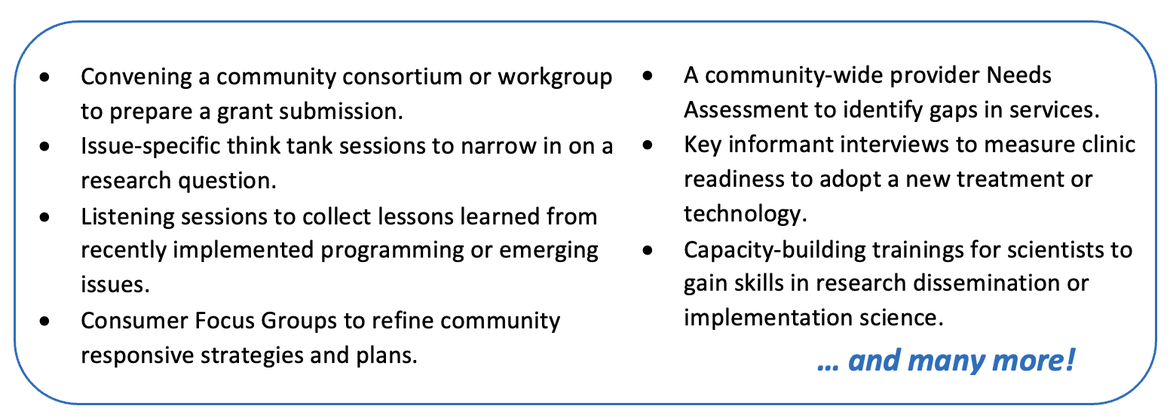SD CFAR Community Research Kick Start Grant
Sidebar
Background:
This funding opportunity is intended to help support workshops, planning meetings, symposia, or other activities that are designed to promote new science, foster new collaborations, or increase capacity building. The purpose of the program is to “kick start” the development of new research ideas and other projects to address emerging issues and needs of communities most impacted by HIV. Community collaboration and partnership are required.
The San Diego CFAR promotes scientific and clinical studies in HIV and fosters researchers using innovative strategies to prevent new infections, optimize HIV care, and develop a cure while promoting health equity for people living with and at risk for HIV. Priority will be given to applications that align with the research priorities of SD CFAR, the NIH Office of AIDS Research, and recent NIH health equity FOAs (RFA-DA-23-024 and RFA-DA-23-023).
Funding Details:
Funding allocations will range from $500 up to $10,000 in direct costs, based on proposed activities. Note that for institutions outside of UC San Diego, the available funding may be affected by the indirect cost rate. The project’s Principal Investigator (PI) must be a faculty member at a SD CFAR member institution as funds will be issued to the PI’s institution. The project team must also include a community collaborator as a Co-Investigator or Co-PI. SD CFAR may be able to assist in identifying a collaborating faculty member. Proposals undergo review and decisions are made by the SD CFAR Operations Team. Funding may be granted in whole or in part, with no single award exceeding $10,000.
Project periods are not to exceed a total of 9 months, which includes 3 months of administrative start-up (securing regulatory approvals and issuing sub-award agreements) and 6 months of research activities. Awards for this funding cycle must be spent by June 30, 2025. All spending is subject to federal restrictions. An interim report will be required at least 90 days before the project end date and a final report will be due 60 days after project conclusion. Finally, funded projects are encouraged to consult with SD CFAR Community Advisory Boards
Application deadline: August 15, 2024
Award announcement: October 1, 2024
Awards must be spent by: June 30, 2025
Example proposal activities could include:
NEW IN 2024: In addition to the examples below, SD CFAR is interested in activities that will facilitate and inform community-developed recommendations from the 2024 Community Research Town Hall.
Office Hours:
The SD CFAR Administrative Core will host virtual office hours to assist applicants with their Community Research Kick Start grant submissions. Two sessions are available via Zoom:
- Friday, July 19, 11:00 am - 12:00 pm PT, Zoom link HERE
- Tuesday, August 6, 10:00-11:00 am PT, Zoom link HERE
Meanwhile, feel free to email any questions to cfar@ucsd.edu.
Application Details:
Please apply online by August 15, 2024 to: https://redcap.link/SDCFAR_grantapplication
Applications to include the following:
1. Cover Sheet:
- Principal Investigator: Full name, position title, organization name and address, phone number, and email address.
- Co-Investigator or Co-Principal Investigator (collaborating community partner): Organization name, address, phone number, primary contact person name, phone number, and email address.
- Title of Program/Activity
- Human Subjects: Is the proposed activities considered “human subject research”? Yes or No (If yes, notice of IRB approval or exemption must be submitted to SD CFAR by December 16, 2024.)
2. Specific Aims (1 page): List the key objectives of the proposed activities.
3. Proposal Narrative (up to 2 pages): ~ 1,000 words describing the:
- Rationale for proposed activities in relation to promoting science, fostering collaboration, and/or increasing capacity building at SD CFAR and in the community.
- Approach or plan for executing activities within a 6-month research timeline.
- Intended deliverable product or endpoint of the activity, such as a grant proposal, community report, newly formed community consortium, paper publication, etc.
- Organizers and key personnel. List the names, affiliations, and roles/contributions of those who are responsible for implementing the proposed activities.
4. Timeline (1 page or less): Project periods are not to exceed a total of 9 months. This includes 3 months of administrative start-up (e.g., securing regulatory approvals, issuing sub-award agreements, training staff) as well as 6 months to conduct all research activities. All activities must be completed by June 30, 2025.
5. Budget and Justification (1 page): Please outline expenses and provide a brief justification. Make sure to include the total budget for the proposed activities, the amount requested from SD CFAR, and if there are other sources of support. Indirect costs must be included. All funds must be spent by June 30, 2025.
Email questions and applications to: cfar@ucsd.edu

.png)
